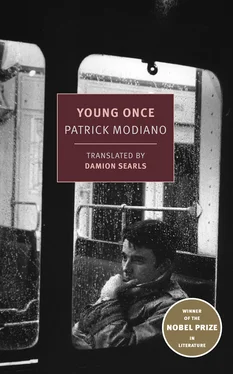“I’ll take it.”
“Good, you can start right away,” Bejardy said.
So the man wasn’t a “star lawyer” after all, as appearances had led him to believe. The word “garage,” like a false note coming from his mouth, came as a shock to Louis. He had to make a mental effort to see this man as the manager of a garage.
“You’ll start at… fifteen hundred francs a month,” Bejardy said.
“All right with you, Louis?”
“Yes.”
“Of course there’ll be bonuses,” Bejardy said.
He stood up and led the others over to the far end of the room. Brossier grabbed Louis’s arm and whispered to him, “You see his office, Louis? Purest Louis XV style… Look at those bronze moldings, stencil-cut, in the back there… acanthus leaves…”
They sat down on a different light blue velvet sofa. A plate of appetizers had been set in the middle of the low table, which was black lacquer, with short, turned legs, maybe Chinese.
“Whiskey? Port?”
Bejardy offered them glasses. Louis took a look around. A library covered the wall to the right, with books in massive, flamboyant bindings arranged on the shelves, most of them in slipcases. Across from the library, on the marble mantelpiece, was a photograph of a beautiful young brunette in a silver frame. Bejardy’s wife? Was this guy really a garage owner? Louis didn’t dare ask him.
Through the French window, he could see the quays and the white Citroën factory across the Seine. A crane rose up from the blocks of stone. What did it mean that here was this extremely luxurious apartment of Bejardy’s, and there, on the other bank, that landscape of factories, docks, and warehouses under a gray sky? No, Bejardy didn’t live here by chance, and he must have felt the contrast between the book bindings and overly heavy carpet in the living room, and the sad little houses in Javel.
“Is your name really Memling?” Bejardy asked.
“Yes.”
“Are you related, by any chance, to Memling the bicycle racer? The one who married a dancer at the Bal Tabarin?”
Louis hesitated a moment.
“Yes. We’re related.”
•
Curious about the place where his mother had worked, he looked up the Bal Tabarin’s address, but at its number on rue Victor-Massé he found himself in front of a blind façade. They must have turned the old music hall into a dance hall or a garage. It was the same feeling as the one he’d had the night he walked down boulevard de Grenelle for the first time to contemplate the Vel’ d’Hiv, in memory of his father.
So neither of the two places that had been the center of gravity of his parents’ life existed anymore. A feeling of anxiety rooted him to the spot. Sections of walls were falling on his mother and father, in slow motion, and their interminable collapse raised clouds of dust that smothered him.
That night, he dreamed that Paris was a black cross with only two places lit up: the Vel’ d’Hiv and the Bal Tabarin. Panic-stricken moths flew for a moment around the lights before falling into the hole. Little by little they formed a thick layer, on which Louis walked, sinking up to his knees. And soon, turned into a moth himself, he was siphoned up with the rest.
•
Children played in the courtyard at noon. He heard their shouts and cries through a half sleep. Odile had already left, busy working on her record. He had breakfast across the street at the Royal Champerret, where Odile would come meet him. Later, he would go with her to her appointments. First she was going to the record company behind the Gaumont Palace, to meet with Dauvenne or Wohlfsohn, as Bellune had advised her to. It was Wohlfsohn who met her there.
He listened to the end to the flexi-disc and told her, in a very gentle voice, that “it wasn’t right for their list” but that he would give her a list of impresarios, club managers, radio people, and other record company executives who might be interested in “this project.” He drew up the list in front of her, occasionally consulting a phone book to check an address or phone number. Then he folded the sheet of paper and put it in an envelope.
“Here you go. I’ll also give you my business card. Say that I sent you.”
He stood up and walked her to the door of the office. He shook her hand, and said, in a suddenly emotional voice, “Did you know Georges Bellune well?”
“Yes.”
“It’s really terrible. Such a good person…”
He was still standing in front of her.
“I knew him in Vienna… before the Flood.”
She didn’t know what he was trying to say. Before the Flood?
“Good luck to you.”
He stuck his head out the door and said again, “Good luck.”
•
Sometimes, before her appointments, they would sit in the waiting room together. The interview usually didn’t last long, and she would come back out looking discouraged, her flexi-disc in her hand.
In the places where he waited alone while she presented her songs, he would flip through the magazines piled on the low tables, like in a dentist’s office. There were articles on the new records, the hits du jour, full of names most of which would disappear next season. Busy people opened doors, letting out bursts of music.
One evening, when he was waiting outside, in the middle of a hallway, for her to finish playing her record for someone, Odile’s voice came to him, smothered by the clacking of typewriters, the hum of conversations, and the ringing of telephones, and he wondered if there was any point to all this.
•
They had been sitting in a large lobby for a long time, and they could see through half-open doors the empty offices that their occupants must have just left, leaving behind polluted air and a smell of cigarettes. The clock on the wall across from them said eight o’clock.
“I’ll wait for you outside,” Louis told her. “I’ll be at the café across the street.”
Ten past eight. She couldn’t take her eyes off the clock, its dazzling glass and steel. The silence in the room was so deep that she could hear the faint crackling of the fluorescent bulbs. She stood up and walked over to one of the windows. Night. Outside, a stream of cars flowed down avenue de la Grande-Armée and the double windows muffled the sound of their engines. On the other side of the avenue was the café where Louis was waiting for her. Would she have the strength to go back to him? It was raining.
“Monsieur Vietti will see you now.”
She followed the secretary down a white-walled corridor harshly lit by fluorescent lights, like the waiting room. The secretary pushed open a leather-padded door and let her in.
Two men were in the room, on either side of a semicircular wooden desk. One of them stood up. Tanned skin, fringed suede jacket. He headed to the door. Odile, who had recognized him, greeted him shyly. He answered with a smile.
“Goodbye, Frank,” said the man who had stayed behind the desk.
“Bye.”
After he had left the room, the other waved Odile over to the desk.
“Hello.”
“Hello,” said Odile, her voice filled with nervous excitement.
“Yes, that was Frank Alamo,” the man said, as though answering a question she was about to ask. “I like his work very much. Especially ‘Allô Mademoiselle.’ ”
Brown hair, very young, tan like Frank Alamo, whom he resembled a little; dressed in a navy blue pinstripe suit, even a tiepin. On his desk, which was covered by a sheet of glass, were lots of folders and two telephones.
“Wohlfsohn sent you?”
His soft voice surprised her. Usually the people who occupied offices like his spoke in a domineering voice.
“Would you like to play me your songs? Of course, I’d be delighted to hear them.”
He was almost whispering. She took one of the flexi-discs out of her bag.
Читать дальше












